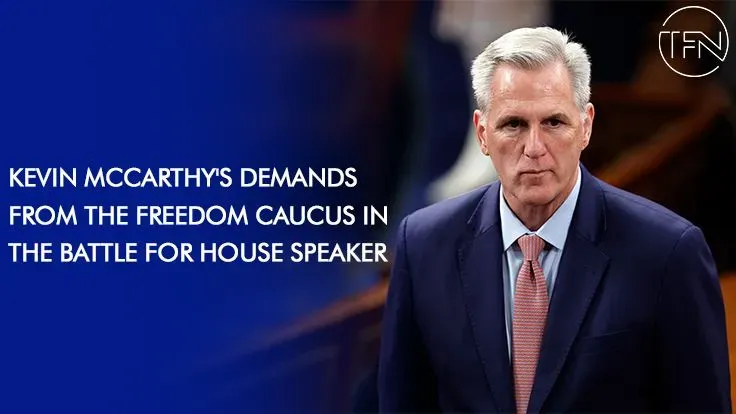On the first election for Speaker of the House on Tuesday, Kevin McCarthy earned 203 votes, 15 votes short of the required number.
The Freedom Caucus, which has long pushed for greater authority in the House and has felt cheated by House leadership, and California Republican McCarthy's up-and-down relationship came to a head on Tuesday.
A group of conservatives, the majority of whom are affiliated with the Freedom Caucus or were supported by its campaign arm, are calling for several administrative reforms in the House that would tip the scales in favor of a tiny but powerful bloc of lawmakers.
While Congress is paralyzed in the absence of a speaker, members of the Freedom Caucus have nothing to lose: Their philosophy is heavily influenced by the notion that the government takes on too much.
Because of how often his opinions and stances change, Rep. Matt Gaetz (R-Fla.), a top McCarthy detractor, stated on Tuesday.
The rules that the Freedom Caucus and others want to alter govern the amount of influence that rank-and-file members have over House leaders, who will decide which bills are taken up by committees and whether the House opens high-profile investigations into the Biden family in the upcoming year.
The request to vacate is significant. McCarthy would be more exposed if he were to serve as a speaker than he would want if he agreed to reduce the bar such that any one member of the House might trigger a vote on whether he should keep the position.
On this, McCarthy has proposed a compromise: a five-member barrier rather than a single member. But while McCarthy sought to placate his opponents in recent weeks, there were many other issues on the table in addition to the motion to vacate.
Seven conservatives wrote McCarthy in December with a lengthy list of demands: They requested the creation of a brand-new congressional committee "with subpoena power" to look into what they termed a "weaponized government." They advised McCarthy to push through a split Congress demands including a prohibition on vaccination mandates by using must-pass legislation, such as budget bills.
House leaders have seldom appointed members of the House Freedom Caucus to the position of chair of committees, which has limited the group's impact. Committee chairmen have the authority to direct which measures are approved and brought to the House floor.
Only one of the 20 "standing" committees in the House is headed by a member of the House Freedom Caucus.
Additionally, Gaetz said that McCarthy failed to accede to recommendations that the House take up specific legislation addressing border policy and budget balance.
In a recent letter to Republican lawmakers, he pledged to make sure that important committees "more closely represent the ideological composition of our conference" and to establish a legislative subcommittee to combat "weaponized government."
However, McCarthy has not changed his stance in other areas. This is made more challenging by a long history of distrust between Freedom Caucus members and House leaders, which has given rise to claims that McCarthy would not uphold his commitments.
Tucker Carlson issued a caution on his Fox News program on Tuesday, saying McCarthy will have to alter drastically to accomplish what he wants.
"Kevin McCarthy will have to do things he would never do otherwise if he wants to be the speaker."
In a Tuesday interview on Fox News, Rep. Chip Roy (R-Texas), a leader in the Freedom Caucus and a vocal opponent of McCarthy, emphasized that he was talking with McCarthy in good faith.
Roy presented McCarthy as an unreliable ally to House conservatives despite McCarthy's extensive contact with Freedom Caucus members in recent years.
Rep. Mike Rogers (R-Ala.), a supporter of McCarthy, threatened to remove legislators from their congressional committees if they voted against McCarthy during a meeting on Tuesday morning, according to Roy, who added that the "threat" was "not well received by others in the room."
Like Roy, the majority of McCarthy's opponents belong to the House Freedom Caucus, a group that believes that the only way to advance conservative ideas is by taking extreme stands against the establishment.
First and foremost, McCarthy has earned support in the House by cultivating ties with various Republican groups, including conservatives like Marjorie Taylor Greene and former President Donald Trump (R-Ga.).

